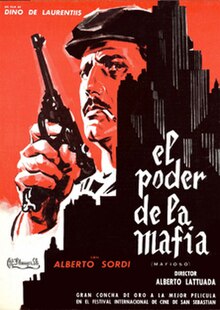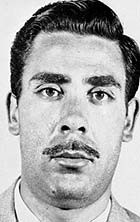
Tommaso Buscetta was a powerful Italian mobster and a member of the Sicilian Mafia. He became one of the first of its members to turn informant and explain the inner workings of the organization.
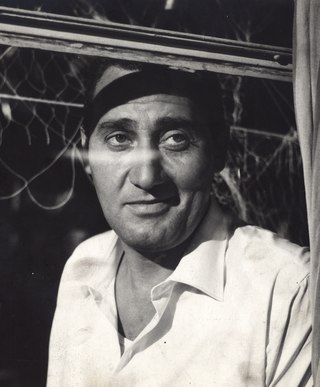
Alberto Sordi was an Italian actor, comedian, director, singer, and screenwriter.
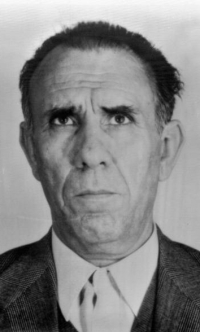
Gaetano Badalamenti was a powerful member of the Sicilian Mafia. Don Tano Badalamenti was the capofamiglia of his hometown Cinisi, Sicily, and headed the Sicilian Mafia Commission in the 1970s. In 1987, he was sentenced in the United States to 45 years in federal prison for being one of the leaders in the so-called "Pizza Connection", a $1.65 billion drug-trafficking ring that used pizzerias as fronts to distribute heroin from 1975 to 1984. He was also sentenced in Italy to life imprisonment in 2002 for the 1978 murder of Peppino Impastato.

Salvatore Achille Ettore Lima was an Italian politician from Sicily who was associated with, and murdered by, the Sicilian Mafia. He is often just referred to as Salvo Lima. According to the pentito Tommaso Buscetta, Lima's father, Vincenzo Lima, was a member of the Mafia but is not known whether Lima himself was a "made member" of Cosa Nostra. In the final report of the first Italian Antimafia Commission (1963–1976), Lima was described as one of the pillars of Mafia power in Palermo.

Stefano Bontade was a powerful member of the Sicilian Mafia. His actual surname was Bontate. He was the boss of the Santa Maria di Gesù Family in Palermo. He was also known as the Principe di Villagrazia − the area of Palermo he controlled − and Il Falco. He had links with several powerful politicians in Sicily, and with prime minister Giulio Andreotti. In 1981 he was killed by the rival faction within Cosa Nostra, the Corleonesi. His death sparked a brutal Mafia War that left several hundred mafiosi dead.
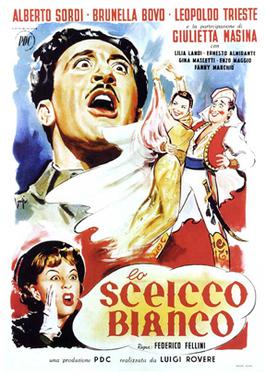
The White Sheik is a 1952 Italian romantic comedy film directed by Federico Fellini and starring Alberto Sordi, Leopoldo Trieste, Brunella Bovo and Giulietta Masina. Written by Fellini, Tullio Pinelli, Ennio Flaiano and Michelangelo Antonioni, the film is about a man who brings his new bride to Rome for their honeymoon, to have an audience with the Pope, and to present his wife to his family. When the young woman sneaks away to find the hero of her romance novels, the man is forced to spend hour after hour making excuses to his eager family who want to meet his missing bride. The White Sheik was filmed on location in Fregene, Rome, Spoleto and Vatican City.
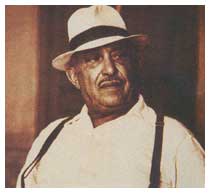
Giuseppe Genco Russo was an Italian mafioso, the boss of Mussomeli in the Province of Caltanissetta, Sicily.
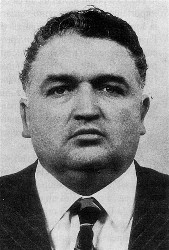
Giuseppe Di Cristina was a powerful mafioso from Riesi in the province of Caltanissetta, Sicily, southern Italy. Di Cristina, nicknamed “la tigre’’, was born into a traditional Mafia family, his father Francesco Di Cristina and his grandfather were men of honour as well.

Giuseppe “Pippo” Calderone was an influential Sicilian mafioso from Catania, eventually becoming the capo of the Catania Mafia family.
The Second Mafia War was a period of conflict involving the Sicilian Mafia, mostly taking place from 1981 to 1984 and involved thousands of homicides. Sometimes referred to as The Great Mafia War or the Mattanza, it involved the entire Mafia and radically altered the power balance within the organization. In addition to the violence within the Mafia itself, there was violence against the state, including a campaign of deliberate assassinations of judges, prosecutors, detectives, politicians, activists and other ideological enemies. In turn, the war resulted in a major crackdown against the Mafia, helped by the pentiti, Mafiosi who collaborated with the authorities after losing so many friends and relatives to the fighting. In effect, the conflict helped end the secrecy of the Mafia.

The Greco Mafia family is historically one of the most influential Mafia clans in Sicily and Calabria, from the late 19th century. The extended family ruled both in Ciaculli and Croceverde Giardini, two south-eastern outskirts of Palermo in the citrus growing area and also rural areas of Calabria where they controlled the olive oil market. Members of the family were important figures in the Sicilian Cosa Nostra and Calabrian 'Ndrangheta. Salvatore "Ciaschiteddu" Greco was the first ‘secretary’ of the Sicilian Mafia Commission, while Michele Greco, also known as The Pope, was one of his successors.
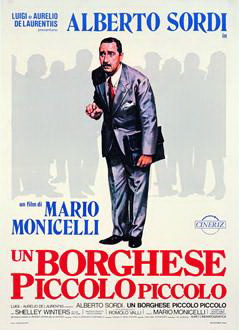
An Average Little Man is a 1977 Italian drama film directed by Mario Monicelli. It is based on the novel of the same name written by Vincenzo Cerami. The movie mixes "Italian-Style Comedy" with psychological drama tragedy. The film was an entrant in the 1977 Cannes Film Festival. In 2008, the film was included on the Italian Ministry of Cultural Heritage’s 100 Italian films to be saved, a list of 100 films that "have changed the collective memory of the country between 1942 and 1978."

Mauro De Mauro was an Italian investigative journalist. Originally a supporter of Benito Mussolini's Fascist regime, De Mauro eventually became a journalist with the left-leaning newspaper L'Ora in Palermo. He disappeared in September 1970 and his body has never been found. The disappearance and probable death of the "inconvenient journalist" – as he became known as a result of his investigative reporting – remains one of the greatest unsolved mysteries in modern Italian history.
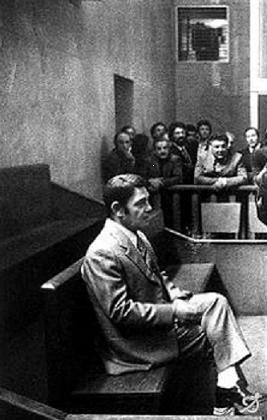
Gerlando Alberti, nicknamed 'u Paccarè, was a member of the Sicilian Mafia. He belonged to the Porta Nuova family in Palermo headed by Giuseppe Calò.
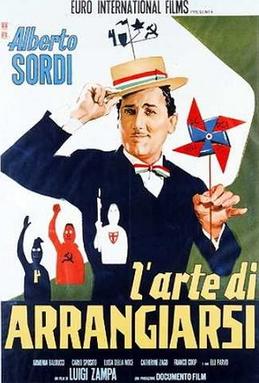
The Art of Getting Along is a 1954 comedy film directed by Luigi Zampa and starring Alberto Sordi. Following Difficult Years and Easy Years, it is the third and final chapter in the trilogy about Italian politics under the continuing shadow of fascism conceived by Vitaliano Brancati. In the person of an unprincipled Sicilian rogue, it delivers a satirical portrait of Italian society from 1913 to 1953.

Salvatore Riina, called Totò 'u Curtu, was an Italian mobster and chief of the Sicilian Mafia, known for a ruthless murder campaign that reached a peak in the early 1990s with the assassinations of Antimafia Commission prosecutors Giovanni Falcone and Paolo Borsellino, resulting in widespread public outcry and a major crackdown by the authorities. He was also known by the nicknames la belva and il capo dei capi.

An American in Rome is a 1954 Italian comedy film directed by Steno. The film consists in a satire of Americanization, and it was referred as "a milestone in the evolution of Italian self-identification". It starred Alberto Sordi, with a young Ursula Andress in a minor role. In 2008, the film was included on the Italian Ministry of Cultural Heritage’s 100 Italian films to be saved, a list of 100 films that "have changed the collective memory of the country between 1942 and 1978."

The Traitor is a 2019 internationally co-produced biographical crime drama film co-written and directed by Marco Bellocchio, about the life of Tommaso Buscetta, the first Sicilian Mafia boss who was treated by some as pentito. Pierfrancesco Favino stars as Buscetta, alongside Maria Fernanda Cândido, Fabrizio Ferracane, Fausto Russo Alesi and Luigi Lo Cascio.
The Minore Mafia clan was a historical Sicilian Mafia clan originating from the city of Castellammare del Golfo on Sicily's west coast. It was probably founded sometime at the start of the 20th century, it later came to control the city of Trapani and held considerable influence throughout the entire province, and also in Palermo and Catania. They historically maintained good relations with the Buccellato Mafia clan, which also hailed from Castellammare del Golfo.
